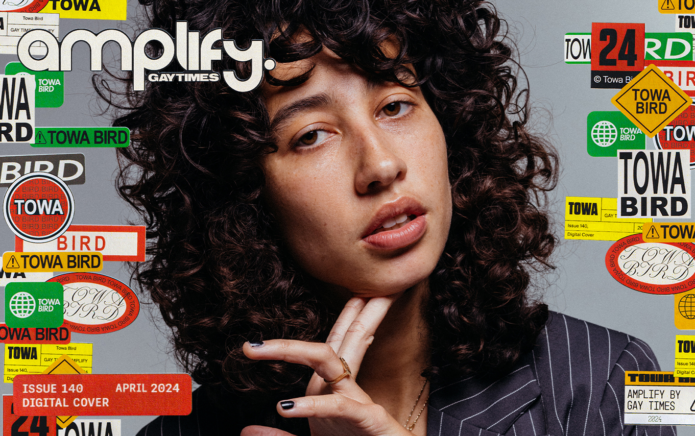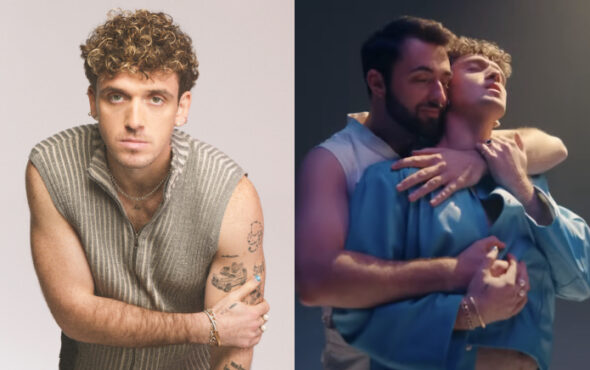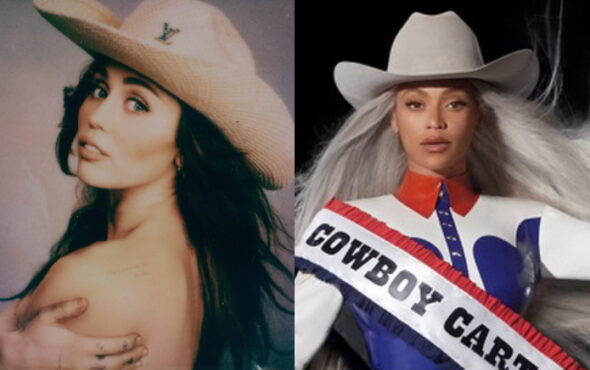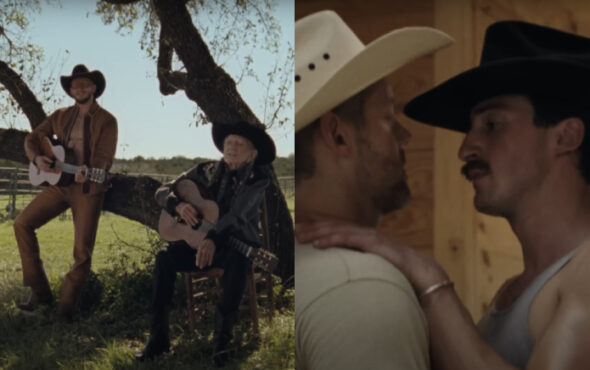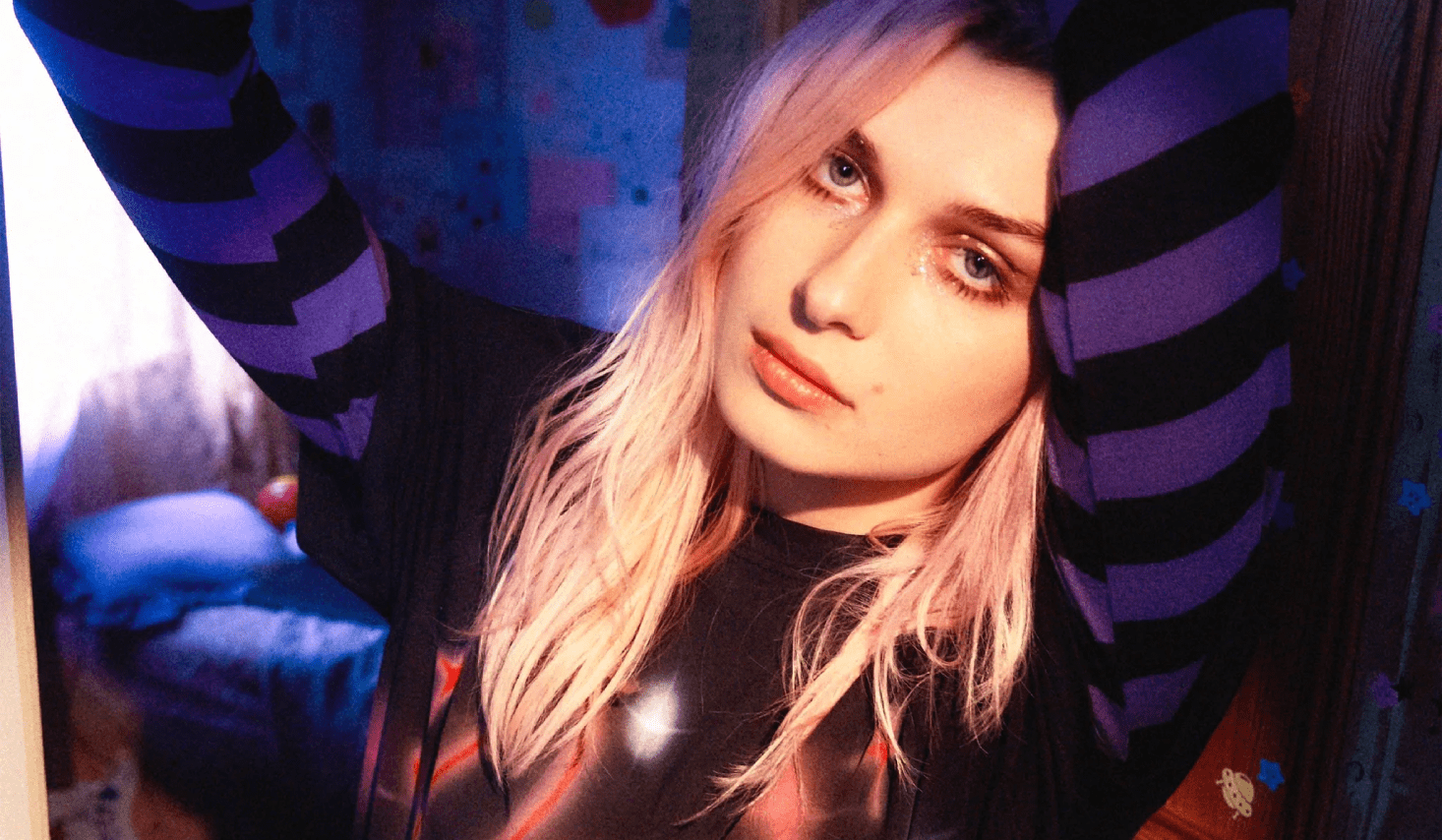
It’s late afternoon and Bella Latham is leading us through the basement corridors of Universal Music’s maze-like building. The star’s new alt-pop flecked release ‘Dream Girl’ is doing well and the musician is bringing us up to speed since we last spoke. As we cut through industry-washed hallways and, later, settle into a recording studio, playfully horrified, she recalls when she burned her torso eagerly trying to steam her favourite Baby Queen-esque t-shirt. This familiar quickness and comedy is inherently Latham’s style.
Lounging on the black couch, the singer is no stranger to quick fixes, the mania of a recording room or cramming in press chats between buzzing new releases. There’s a lot on the cards for the ‘Want Me’ singer. Last year was quite the experience for Latham. The craze of Netflix’s beloved teen series Heartstopper pushed her into the limelight. Coupled with the release of her eclectic mixed tape, The Yearbook, Baby Queen is now all grown up.
A multicoloured beaded necklace, spelling out her new single ‘We Can Be Anything’, sits on her neck as brightly coloured pastel accents lift her relaxed, baggy all-black outfit. Newly christened 25 and leaning into her long-awaited debut album, Quarter Life Crisis, Bella Latham is charting her next new direction. “Since we last spoke, there’ve been some low lows and some amazing highs. I did a lot of touring last year, which takes a lot out of you, and then went straight into finishing this album. I put an extreme amount of pressure on myself, so that was really horrific,” she recalls, frowning at the recollection. Latham’s ascent was undisputable, as were the obligations that came with it — an album.
As artistic blocks and deadlines loomed, the singer-songwriter found herself plagued by the process. At the time, she feigned optimism, sure of a way out. Today, she’s happier and healthier. A trip to her home country, South Africa, seemingly reset the cogs in her mind and allowed her to relax in the achievements she’s made. Revisiting her Durban roots and the reason she wanted to do this was a reminder of what the creative slog had all been for. “I got to drive past the house I grew up in and remind myself where I came from,” she smiles. “That’s been a big part of why I feel happy.”
Rewriting and realigning have been integral to Latham finding her way through things and, for better or worse, she is grateful to be on the other side. “This is one of those moments when you remind me how I was back then. I’m really happy that I’m here,” she says. “It’s growing up, as well, I’ve turned 25 and, supposedly, my brain is fully developed now. I don’t feel as chaotic. I feel like I’ve got more calm and not in my own head. The bundled graduation, from mixtape and EP, to fully-fledged album artist is no easy feat. And, for Latham, neither is committing to a solo idea. “The process of making an album is so complex. You can set out to create a sound or a sonically cohesive album. But, you cannot preempt what that process is going to be like, and you can write one song that changes the whole landscape of the album,” she explains.
The unbridled output of her work, and process, placed the singer in a semi-precarious position — what does she keep. As she began to colour in the corners of her next big release, Latham found the process of jigsawing ideas exhausting. “You’re pulling in other songs that fit in, that didn’t fit in before. It’s this constant chipping away at something,” she motions. “Ultimately, I feel that I’m left with the best work of the past three years and the best songs that I’ve written in those years, and that’s what people will be hearing now.”
Hindsight, however, is always crystal clear. “I’m in a different space after completing it. I have to promote this album, but I’m thinking about the next one. It was my first time making something that I was going to call an album, and I didn’t know what it was gonna be like. It was tumultuous and horrific. I fucking hated it. I feel deeply fulfilled by the experience, but it was traumatic for me. It was this churning fear of not being good enough. Hopefully, I can do the second album in a healthier way that is not so intense.”
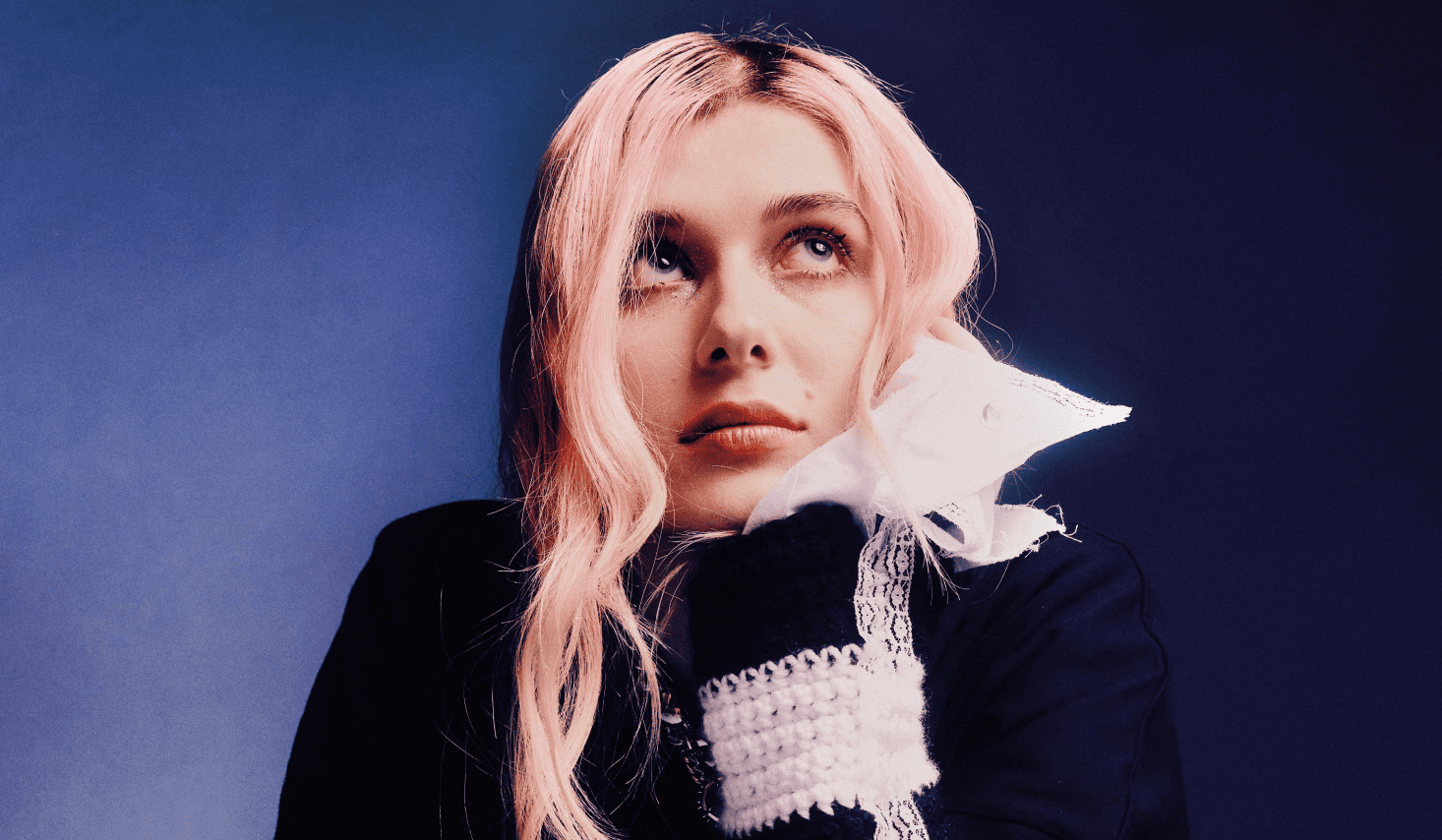
Coasting the gap between singles the album announcement can be an anxiety-including one. But, for Latham, she’s been doing it side by side with her die-hard fandom, the Baby Kingdom. A pastel pink-haired supreme ruler of misfits, ambitious daydreamers and internet escapists, Latham has rallied a community seeking to be seen, heard and represented. On tour, the connection between crowd and gig-goer is self-evident. In the throngs of a new generation of engineers of intimacy and intelligent lyricists, Latham falls alongside the Gracie Abrams types who, in a gaping room, can make it feel like she’s singing directly to you. “It’s weird, it doesn’t feel crazy. It feels very natural, that connection and it’s not something that I would ever take for granted – there’s such a sense of belonging,” she says. Her fans spend hours dotingly clarifying Baby Queen-inspired jeans, scribbling on shirts to imitate Latham’s on-stage character quirks or sharing fan-made bracelets; a joyful reminder of the thrills and limitlessness you can find in (live) music.
And, a new pop purveyor who pulls this off is, of course, Olivia Rodrigo. A friend of Latham’s and label mate, the American artist swooped in on the opportunity of taking the South African on tour. “It was one of the biggest, if not the hottest tour, of the year and to be asked to do that was insane. I was so excited and I had no idea what to expect, because I’d never played gigs that size before. You know it’s going to be a certain level of insanity but you can’t quite gauge that until it happens,” she recalls almost in disbelief.
“I remember getting to the first show and looking through her purple curtains and you could see the crowd. It was the first support tour I ever went on, so to have that experience, it’s incomparable.” Now, it’d be unfair to attribute Rodrigo for Latham’s breakthrough moment. When, in fact, it’s her 2020 Jodie Comer-inspired single ‘Want Me’ that catapulted her to mainstream attention. A fiendishly slick synth-pop banger, Latham pulled in fans across the industry for a dose of her smart pop tunes. And, from there, the Baby Kingdom has only continued to grow.
In April last year, almost everything changed for Latham, again. A little joyous coming-of-age series called Heartstopper hit Netflix. Latham was no stranger to fan bases but this was something different. “It was like being hit by fucking pan on the head!” she laughs. “I was like, ‘What the fuck is going on?’ For two months straight! That was insane. It was nuts.” Latham went from featuring on the TV show’s soundtrack to becoming buddies with the cast. As her music soundtracked some of Heartstopper’s most moving scenes, new fans flocked to her music like never before. “I had no idea what to expect. You don’t know that there’s this fanbase that exists like that and that was just completely nuts,” she smiles.
The mania of Heartstopper won’t be ending soon either. With season two now out, the musician makes a graceful cameo but her crossover with creator Alice Oseman doesn’t end there. Latham’s debut now also has a limited release run with album art penned by the Heartstopper webcomic creator. Favourite albums, of course, stick with us. The 1975, who Latham never fails to mention, led as an example for her. And now, it’s her turn to release a career-defining full-length project. We all remember iconic big releases. From Nirvana’s Bleach to Paramore’s All We Know Is Falling, they ambitiously created something bigger than themselves. “It’s weird to imagine that my music could play as big a role in someone else’s life as my favourite albums have,” Latham says, pausing. “You know when you love an album, that album becomes you. It becomes the story of a number of years of your life. You can put that album back on and think of where you were and what you were doing. Albums are really important; that’s what my whole fear with making an album, and calling it that, was. I have the biggest respect for the word.”
The singer’s initial scepticism has been gradually offset by the response to her new singles. ‘Dream Girl’, a playful, narrative-switching, pining alt-pop track, glows with Baby Queen’s sonic emblem. Follow-up ‘We Can Be Anything’ is a jaunty existential ode to her favourite Heartstopper characters (and to herself). And to seal off the trifecta of new tunes, ‘All The Things’ is a twinkling narrative sleeper hit coloured with the characteristics of her beloved Medicine EP. Think a Baby Queen-codified re-envisioning of The Cure’s Disintegration. At the time of our chat, the latter two singles haven’t been released and Latham is feeling, largely, relaxed. As we poke fun at the universality of ‘Dream Girl’ Latham jokingly quips she has fallen for numerous straight girls. But buried beneath the humour, the single marked something bolder and more nuanced for the South African – it was the first time she’d outwardly written about a girl.
“People always ask me, ‘Did you write the song for the queer community?’ It’s always, no, I don’t write my music for anyone else. My music is very much for me. The importance is in the honesty, and being able to tell your story, because if you put it out there, people can hear it, and it normalises it,” Latham explains. “It’s visibility and that’s where we can help, just by being honest, not hiding ourselves and not feeling ashamed.”
Unpacking identity is delicate and anything can derail your emotional transition to accepting another side of yourself. Latham’s reluctance dwelled largely on how she would be perceived. “I completely despise the [LGBTQ+ music] label thing, because it becomes the word that people use to define you,” she says. “Instead of thinking that great lyricist, it’ll be, ‘the bisexual’ or ‘the gay’ artist. It becomes your defining word. I don’t think that it is my defining quality. It’s one aspect of who I am. Gayness is just a small part of my life. I barely even date people, that’s such a small facet of my world.”
Stepping into the colourful shoes of Baby Queen gave Latham the nudge to open up more. The line between her on-stage persona and her 25-year-old self can feel like creative whiplash. But now, the singer has drawn a crayon line marking her boundaries. “It’s healthy, in a way. Imagine not being able to separate yourself from the name. The alter ego makes you more confident to push the boat out in a way you wouldn’t with your actual self, because you’re protective of yourself,” Latham says. “You get to bring your wildest dreams to life through the alias and through the character that you’ve built. It’s not, ‘not you’, it’s just who you would want to be if you weren’t afraid.”
While parts of Latham’s quarter life crisis has been temporarily subdued, the clarity has become a gateway to growth and confidence. From stacking synths on an outwardly open track about liking girls to lamenting about someone she longs for, this era of Latham is enjoyably forthright. Her new tracks are slowly being wheeled out onto international stages too, mostly across Europe and UK festival spots.
With ‘Dream Girl’, Latham doesn’t want to lead by example but add to the effort of destigmatising identities. “For people that are part of the LGBTQ+ community, it’s so important for us to be around each other. People who are open about their sexuality are so brave. I used to be so scared of it. I wasn’t there yet. It’s a journey that people have been able to go on with me,” she admits. “As soon as you accept yourself fully, you can’t lie. I can’t anymore because I’m not ashamed anymore. As soon as you can accept who you are, the world moulds around you and you end up where you belong. I’m so much happier that I can just be like, ‘Fuck yeah, girls are hot.’”
And, cohesively, Quarter Life Crisis, is an amalgamation of all the things we have learned to expect from Latham; a record knotting confessions of love, existential notions of personhood, and thinking obsessively about someone else. The project may have put her “through fucking hell” but something greater came out of it. As for ‘We Can Be Anything’, the singer opts to sign off our chat, surprisingly, with a note of optimism. “I don’t think I could fully say that I’m nihilistic, but I’m super existential,” Latham ponders. “I believe that there’s no point to being alive, which can be quite a grim belief, but life is this incredibly beautiful thing.”
And as with her Baby Kingdom, her Heartstopper friends and those she finds along the way, Latham embraces the opportunity to experience shared amazement. “It’s one of my biggest beliefs in life. You have the freedom and the prerogative to do whatever you want to with your life. There’s laws and there’s rules, but it’s all constructed and you can be anything. You are free, that’s the sentiment. I just want people to listen to it and know that they are completely free to live the life that they want to live.”
